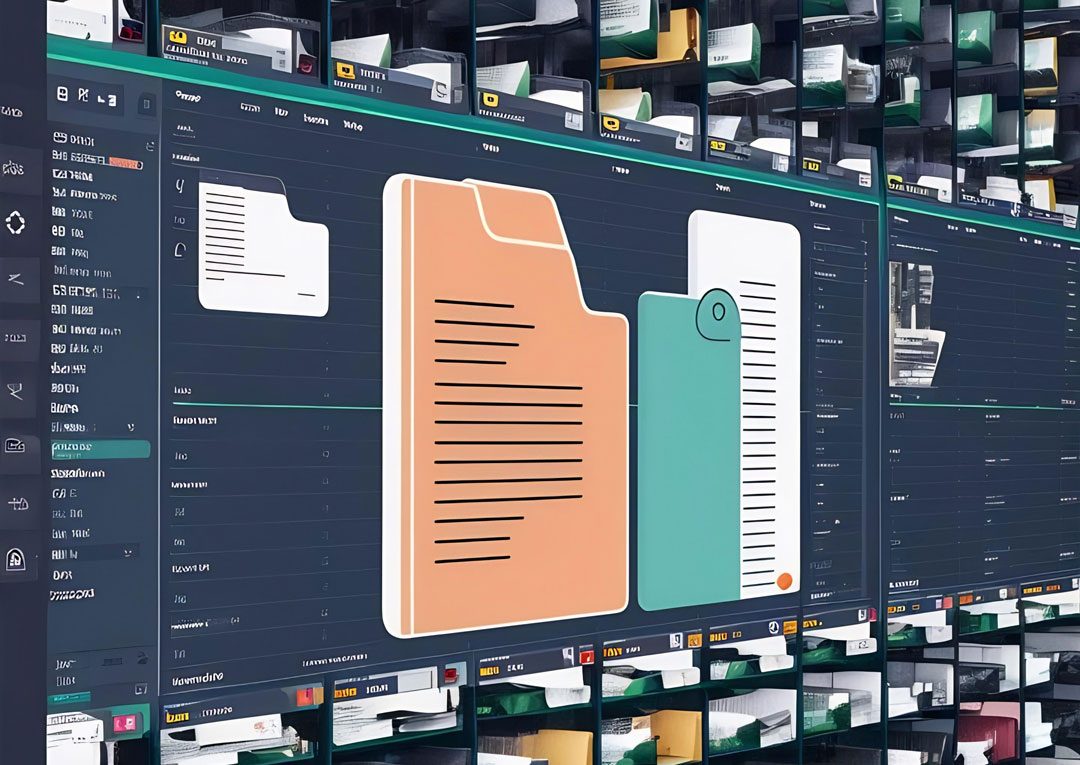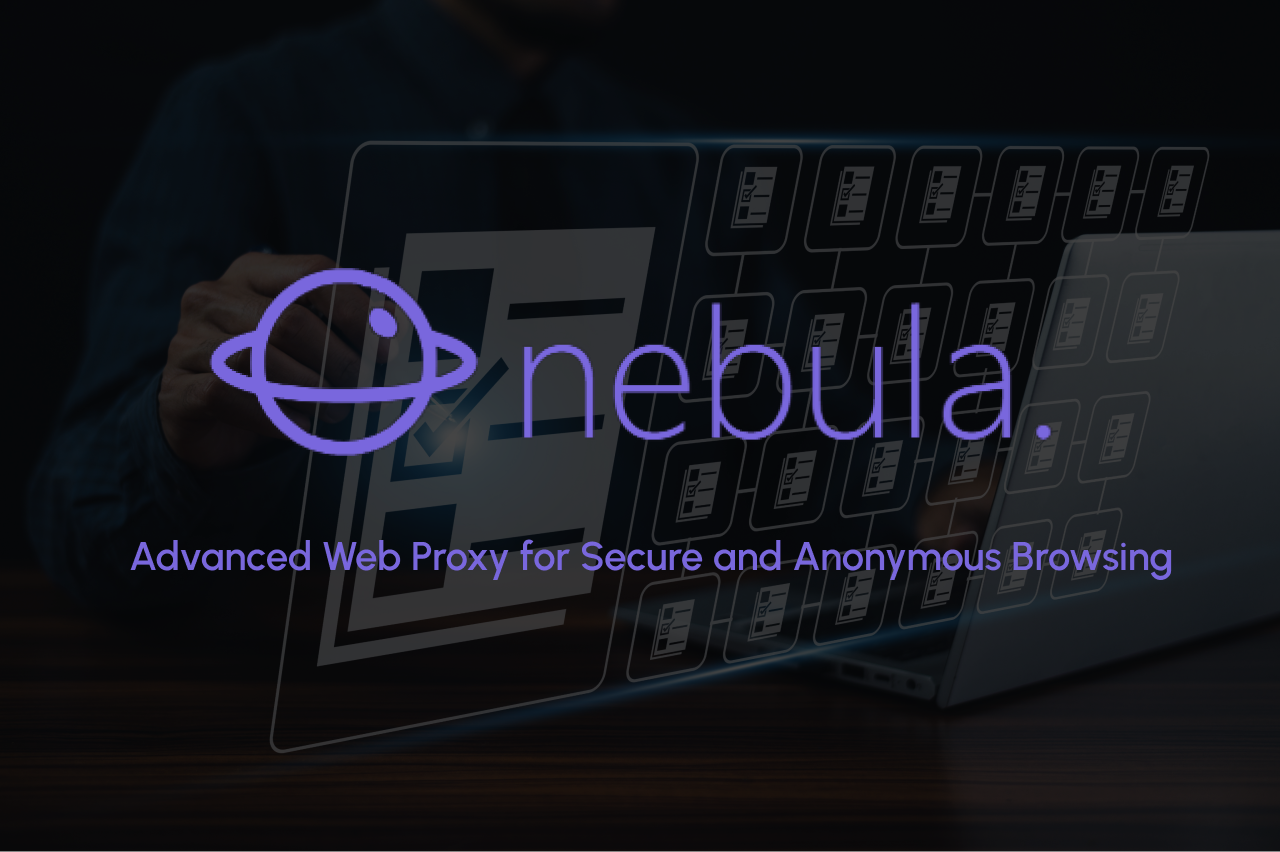Today’s high-end business intelligence heavily relies on web scraping, where proxies play a critical role. By gathering large volumes of data from online sources, proxies can help make data-driven decisions in real-time if needed. However, collecting data isn’t always easy, as CAPTCHAs, IP filtering, and rate limits pose challenges for many proxies.
In this in-depth article, we’ll introduce you web scraping proxy services and explain how they work. We’ll also discuss the main types of proxies, which we’ll also compare, and we’ll review the best proxy services for Web scraping in 2025.
What are Proxies for Web Scraping?
A web scraping proxy serves as a vital component in web scraping operations. They offer anonymity and access to restricted data across various websites. These proxies work by routing web scraping requests through different IP addresses, minimizing the risk of getting blocked by target sites.
By using web scraping proxies – either rotating proxies or residential proxies – data extraction processes can be conducted at scale, gathering information such as pricing, reviews, and market trends. Businesses rely on these proxies to ensure seamless data collection, helping them make informed decisions based on real-time, unrestricted data.
To learn more about what web scraping proxies are and how they work, you can explore our detailed guide in another article.
Key Features of the Best Proxy Services for Web Scraping
 A capable proxy scraper should help increase your system’s security, avoid IP bans, enable access to geo-blocked web sources, and should feature effortless scalability. Let’s go over everything in greater detail:
A capable proxy scraper should help increase your system’s security, avoid IP bans, enable access to geo-blocked web sources, and should feature effortless scalability. Let’s go over everything in greater detail:
- Increased Digital Security: Proxies can help anonymize and secure your Web requests. They change your IP address, which means they also hide your actual location. Furthermore, when utilized properly, they can also scramble your Web traffic using various Internet traffic protocols.
- Avoid IP Bans: Websites can employ several different types of systems to prevent scrapers from working. For example, they can limit the amount of crawlable data and prevent proxies from making too many requests. A Web scraper can utilize a substantial pool of IPs to overcome this issue, among other things.
- Access to Geo-Blocked Sources: Scraping for marketing and sales purposes often requires businesses to scrape sources from different geographical locations. Web scrapers using residential proxies can easily bypass geo-blocks. They also avoid suspicion by using local IP addresses instead of foreign ones.
- Scalability: Web scrapers typically offer smart ways to scale their operations. Instead of simply providing more IP addresses and more aggressive requests, the best ones provide intelligent ways to scale operations, such as adding additional scraping sessions and anonymizing concurrent sessions.
Comparison of Residential, Datacenter, ISP, and Mobile Proxies
There are four main types of proxy scrapers: residential, datacenter, ISP, and mobile. They all have their strengths and weaknesses, so let’s explain what to expect from each:
- Residential Proxies: These proxies provide residential IP addresses obtained from various ISPs (Internet service providers). Their most significant benefit is that they use legitimate residential IPs, making them a practical solution for bypassing IP-based anti-scraping mechanisms and geo-blocks.
- Datacenter Proxies: Unlike residential proxies, these use IP addresses from data centers (they don’t come from ISPs). They provide a lot of processing power and are used as proxies for large-scale scraping, but they can’t bypass more rigorous anti-scraping checks. They’re often used for market research.
- ISP Proxies: This type of proxy relies on static IP addresses that come from data centers. They’re also known as “residential static proxies.” They typically cost more as their number is limited, and they offer an excellent option for bypassing geo-restrictions and gathering data from sites with strict IP protections.
- Mobile Proxies: Here, we have IP addresses from mobile devices that use mobile data (3G, 4G, and 5G connections). In general, they’re more expensive than other proxy types and they’re slower as well. However, since they’re legitimate IPs, they’re often used for scraping social media platforms without verification prompts.
Top Web Scraping Proxy Services in 2025
In this segment, we’ll review 10 of the best proxy providers for scraping in 2025, hand-picked after rigorous research and testing. First, we’ll compare the most prominent features of our recommendations and then dive into the specifics of various paid and free proxies.
| IP Pool | Types of IPs | Locations | Free Trial | Support | |
|---|---|---|---|---|---|
| IPRoyal | 34M+ | Residential Datacenter Mobile | 180+ | No | Documentation FAQ Live Chat |
| ScraperAPI | 40M+ | N/A | 50+ | Yes | Documentation FAQ Contact Form |
| Nimbleway | N/A | Residential | N/A | Yes | Documentation FAQ |
| Shifter | 31M+ | Residential | N/A | No | Documentation Live Chat |
| Rayobyte | N/A | Residential Datacenter Mobile | 25+ | Yes | Documentation Email Support Live Chat |
| HasData | 3.7M+ | Residential Datacenter | N/A | Yes | Documentation Contact Form |
| GeoNode | N/A | Residential Datacenter Mobile | 160+ | No | Documentation Contact Form |
| ProxyScrape | 40K+ | Residential Datacenter | 140+ | Yes | Documentation Live Chat |
| Open Proxy Space | N/A | Residential Datacenter | 85+ | Yes | Contact Form |
| ProxyMesh | 350+ | Datacenter | 17+ | Yes | Documentation Live Chat |
1. IPRoyal
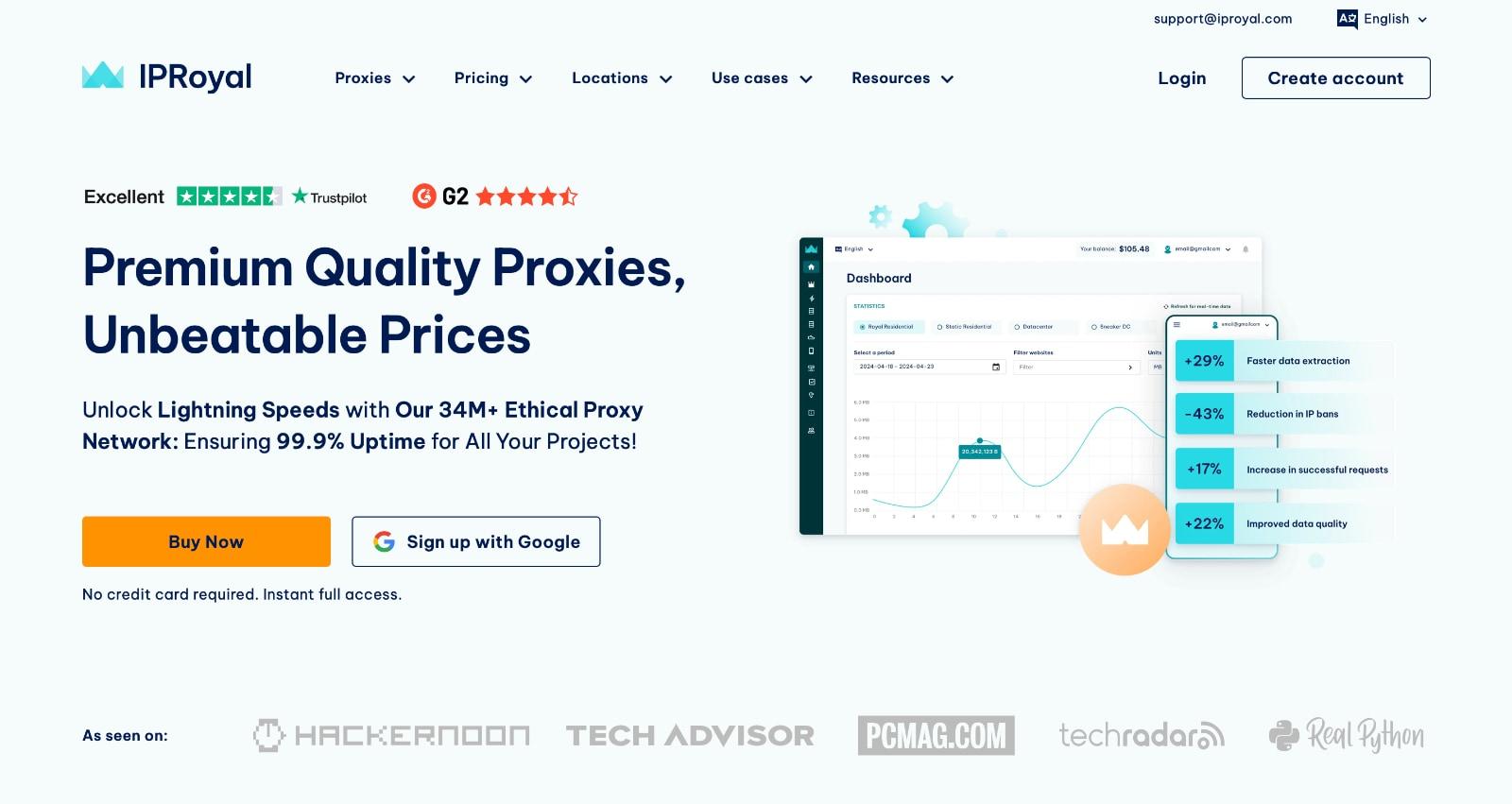 IPRoyal relies on residential IP addresses to avoid blocks and CATCHAs, and this provider has over 32 million IPs. It also covers 195+ locations, which is fantastic if you need to target a specific country, region, or city. It’s worth knowing that IPRoyal also offers datacenter, mobile, and static residential proxies.
IPRoyal relies on residential IP addresses to avoid blocks and CATCHAs, and this provider has over 32 million IPs. It also covers 195+ locations, which is fantastic if you need to target a specific country, region, or city. It’s worth knowing that IPRoyal also offers datacenter, mobile, and static residential proxies.
Furthermore, this provider’s proxies support HTTP and SOCKS5 traffic. They also offer unlimited bandwidth and threads, which means there are many possible practical uses for IPRoyal. In terms of its mobile proxies, those rely on 5G, 4G, and 3G connections and can achieve speeds of up to 100 Mbps.
Unlike most other proxy scrapers, this one allows you to buy a certain amount of traffic. So, you’ll avoid subscription plans. IPRoyal starts at $1.75/GB for rotating residential proxies.
2. ScraperAPI
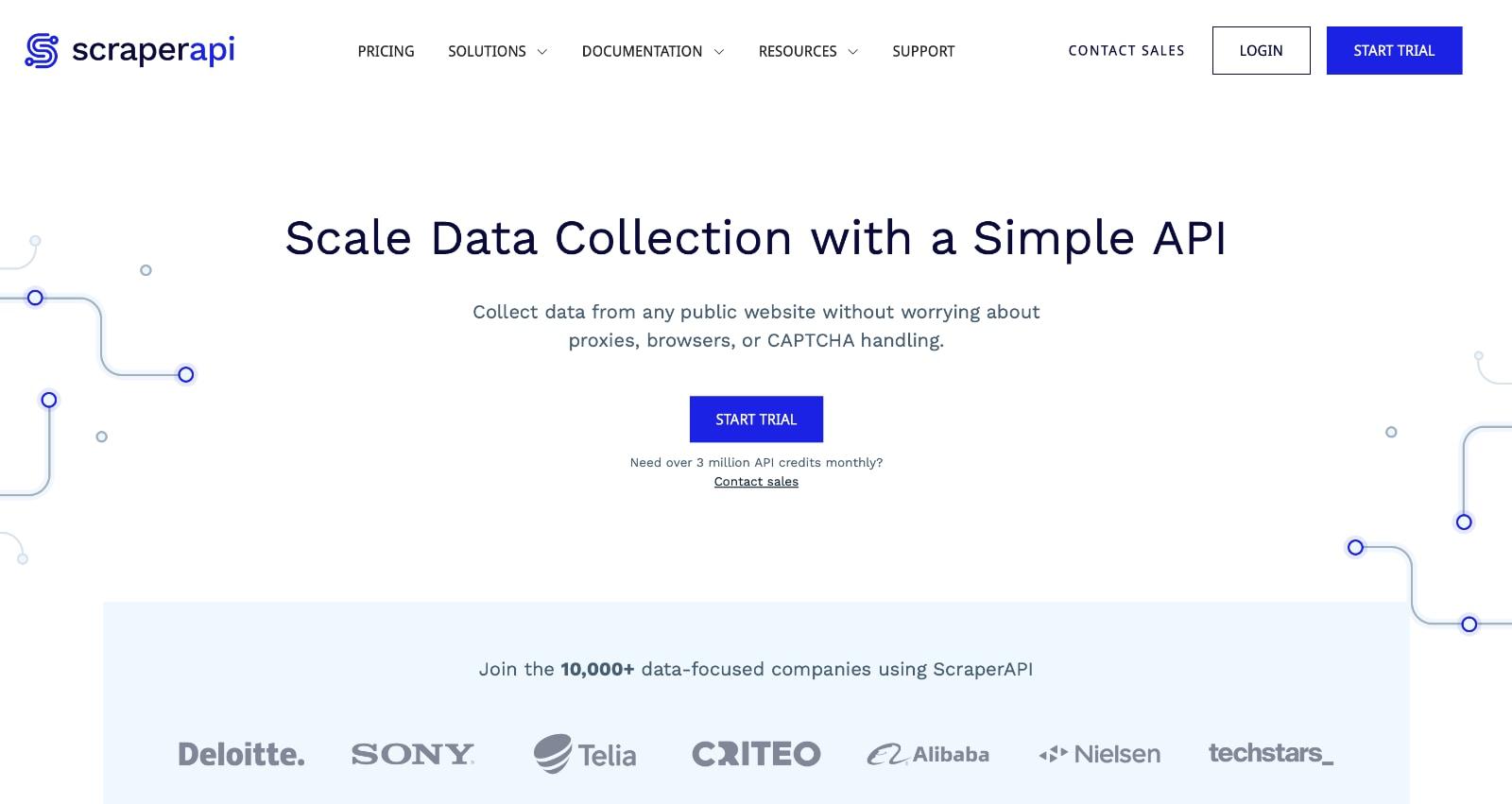
Being a powerful proxy solution with numerous possible use cases, ScraperAPI knows how to collect data while bypassing anti-proxy systems. Thanks to its structured data endpoints (SDEs), this proxy provider targets Google, Amazon, and Walmart, while the possibility of custom integrations is also on the board.
ScraperAPI offers 40 million proxies in 50+ countries, supports residential and rotating proxies, and supports JavaScript rendering and JSON auto-parsing. As such, it provides a one-stop solution for web scraping, with tools that can bypass anti-bot systems, rotate IP addresses, and target specific countries or regions.
This proxy provider offers a 7-day free trial. Then, you can opt for several different plans, starting at $49/month for 100,000 API credits and 20 concurrent threads.
3. Nimbleway
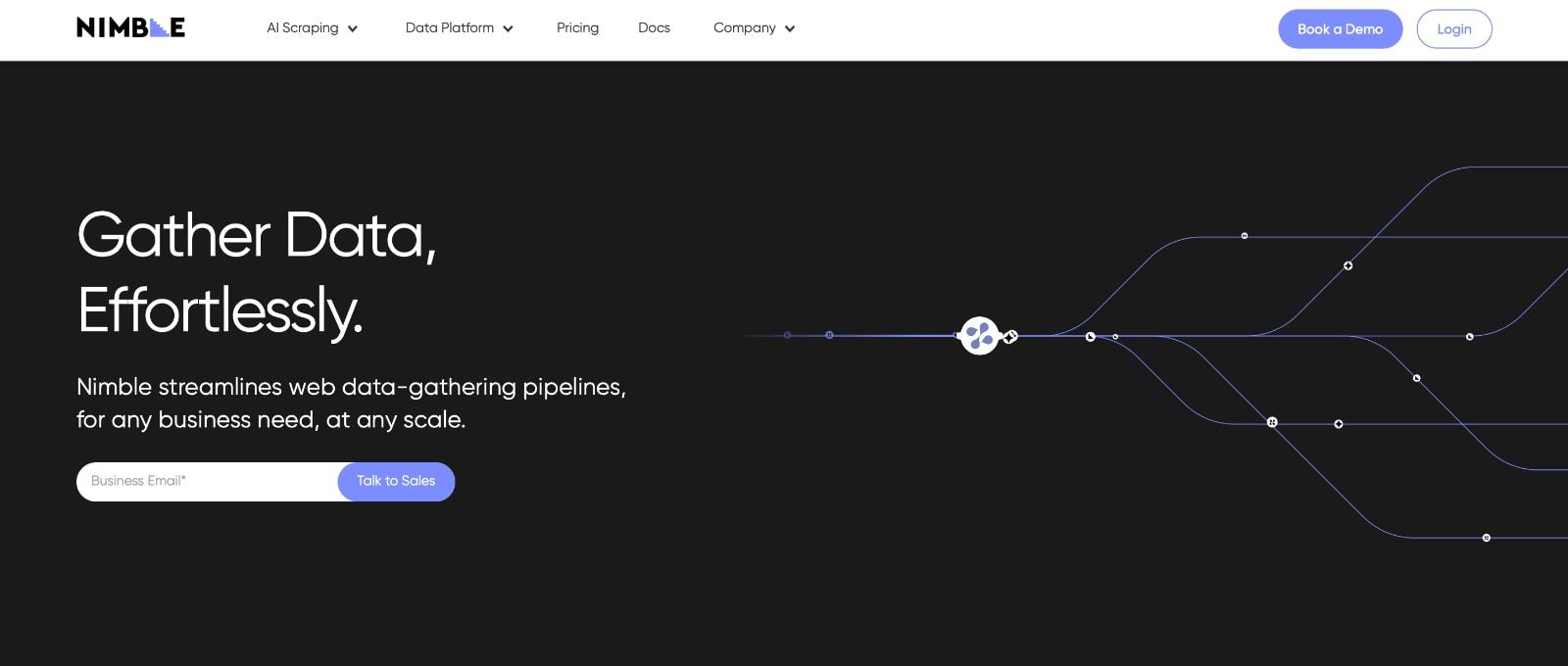
Here, we have an AI proxy scraper with advanced parsing skills. Nimbleway promises high-end web scraping with perfect accuracy, active crawling of unlimited sources, and multi-layered data validation. In simpler terms, Nimbleway can effectively gather data even from the most guarded sources and bypass advanced anti-bot systems.
A unique feature of this proxy provider is its ‘Nimble AI Browser,’ which creates custom fingerprinting profiles, sends data through Nimbleway’s residential proxy layer, and can render any webpage with its robust JavaScript engine. As a result, this browser boasts higher success rates and infinite scalability.
Nimbleway’s subscriptions start at $150/month for the basic set of features and 30 pipelines. However, its high-end plan costs up to $1,500/month.
4. Shifter
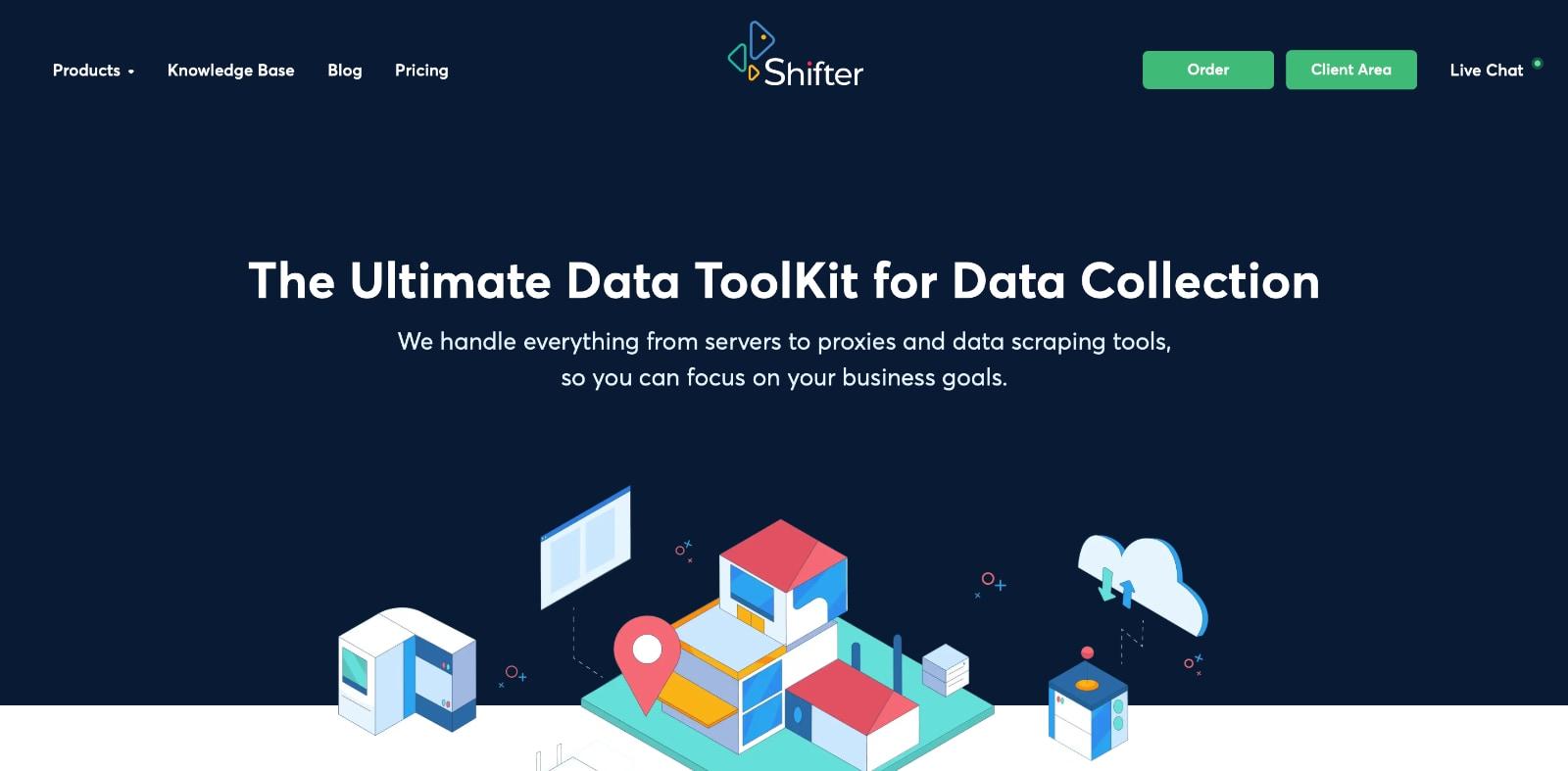 Formerly known as Microleaves, Shifter offers an extra-wide proxy network with over 31 million IP addresses. It’s known for its advanced rotation features, which are great for avoiding detection. Shifter can rotate IPs frequently, mimicking typical user behavior, or you can set a custom rotation interval.
Formerly known as Microleaves, Shifter offers an extra-wide proxy network with over 31 million IP addresses. It’s known for its advanced rotation features, which are great for avoiding detection. Shifter can rotate IPs frequently, mimicking typical user behavior, or you can set a custom rotation interval.
Furthermore, you can count on unlimited bandwidth, which makes Shifter a good option for large-screen scaping, where hitting usage limits could be an issue. It also promises 99.9% uptime, which makes Shifter a highly reliable option.
Several subscription plans are available, starting at $99.99/month for ‘basic rotating proxies’ and $199.99/month for ‘special rotating proxies.’
5. Rayobyte
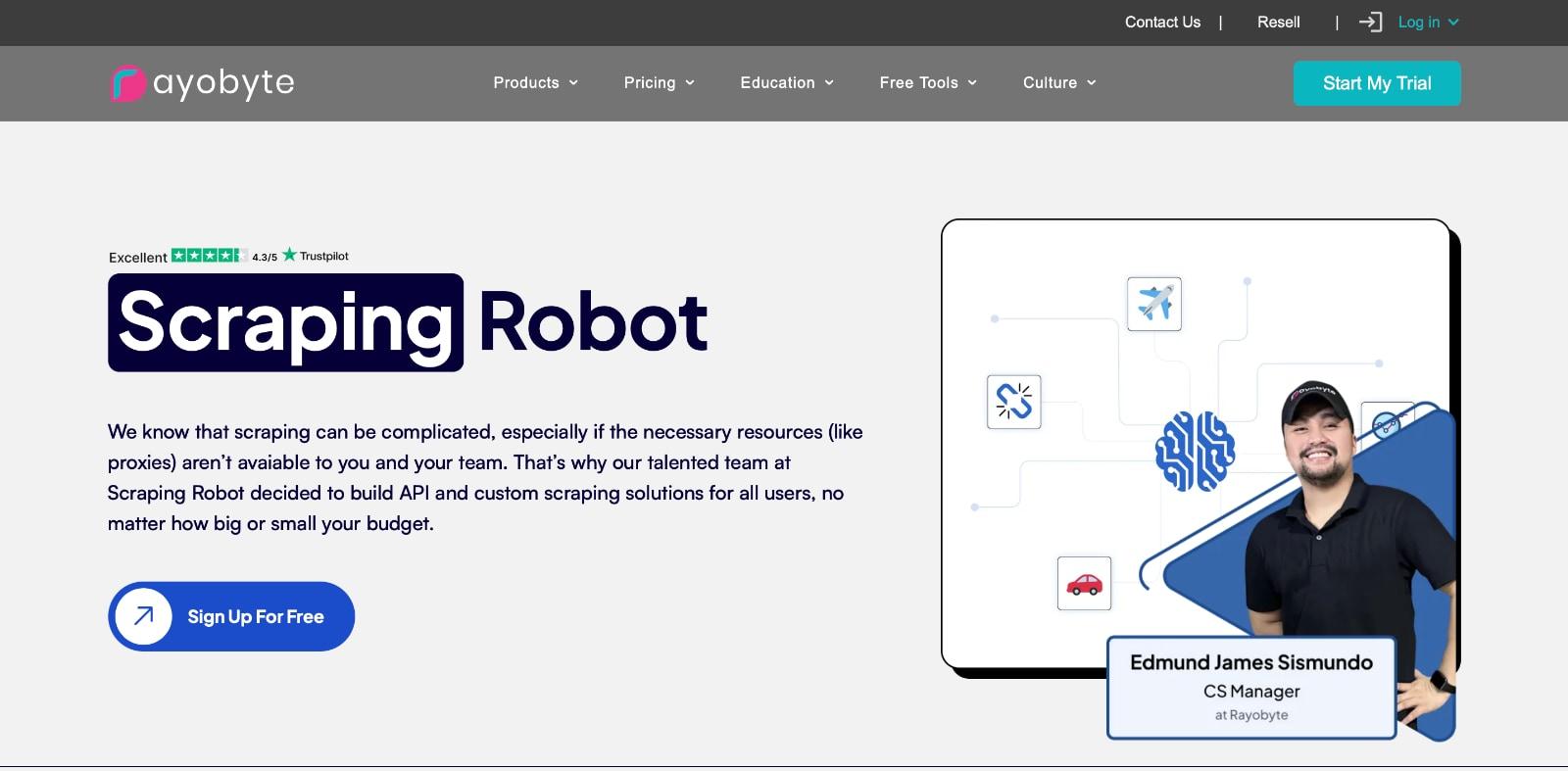
Rayobyte offers a substantial number of datacenter and residential IPs from 25+ countries, making it a handy pick for geo-targeting. Thanks to its wide proxy server, you can count on high anonymity, fast IP rotation, and evading anti-bot mechanisms. Some of the most popular uses for Rayobyte are market research and competitive analysis.
Rayobyte also offers its own ‘Scraping Robot,’ which is designed for JavaScript rendering and transparent usage and stats. It’s one of the fastest-developing scrapers, but it’s currently suitable for up to medium-sized projects. We’ll also note that this proxy provider is known for its speed, featuring optimized proxies.
You can get started for free, which gets you 5,000 scrapes. Then, you can upgrade your plan to 500K scrapes ($0.0018/scrape) or more than 500K scrapes ($0.00045/scrape).
6. HasData
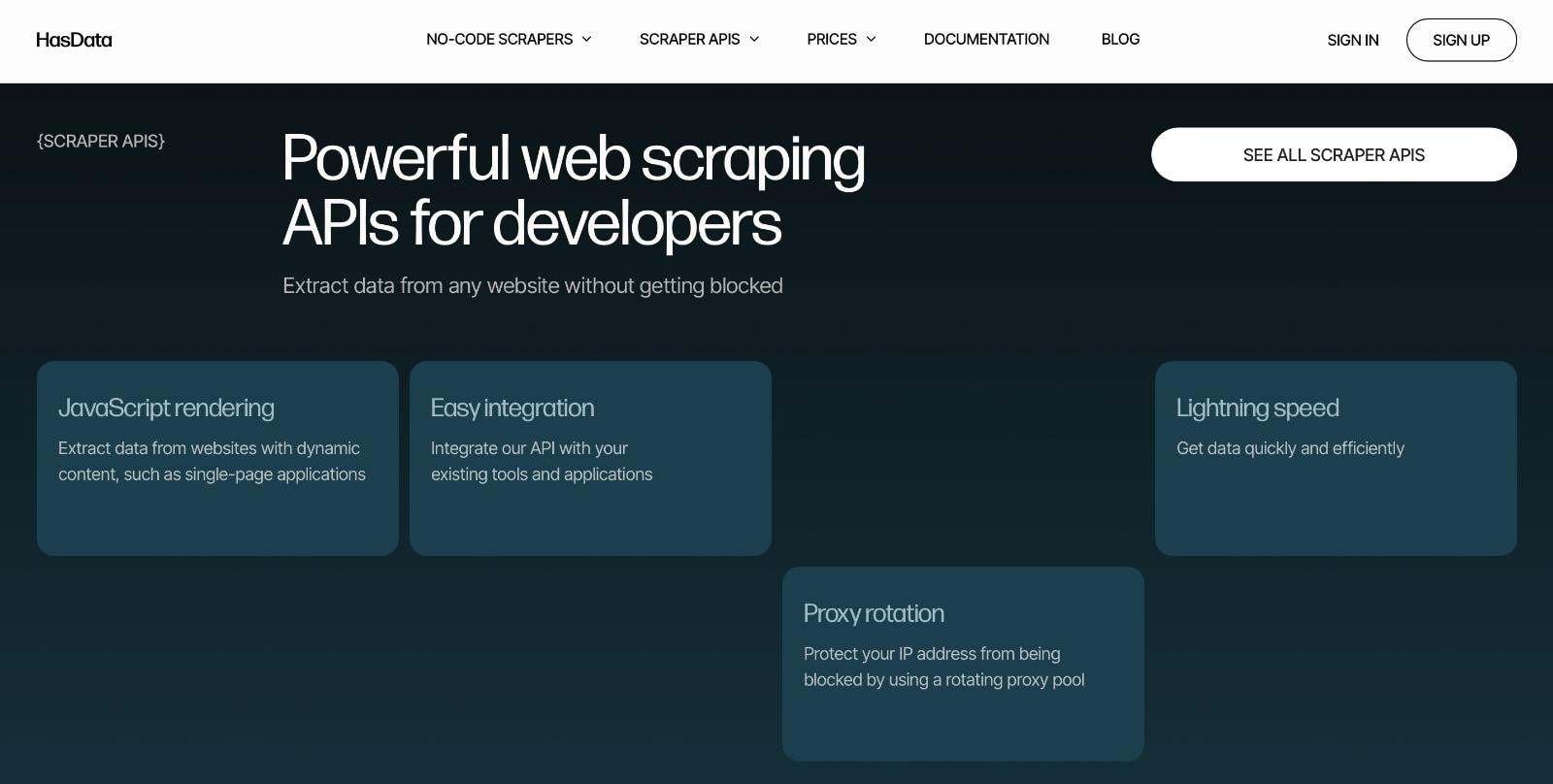
Being one of the most user-friendly proxy scrapers, HasData offers a convenient way to gather, store, and present various kinds of data. It offers no-code scrapers designed to get data from Google, Amazon, Shopify, Amazon, Airbnb, Indeed, Booking, Reddit, and plenty more websites.
It also offers numerous APIs that can collect specific types of information based on very precise parameters, which can then be exported in HTML and JSON formats. It doesn’t offer the most extensive flexibility for large-scale scraping, but it’s fast, reliable, and targets the most popular web sources.
HasData offers a free trial with 1,000 credits. It costs $49.00 per month for 200,000 API credits, 15 concurrent requests, and email support.
7. Geonode
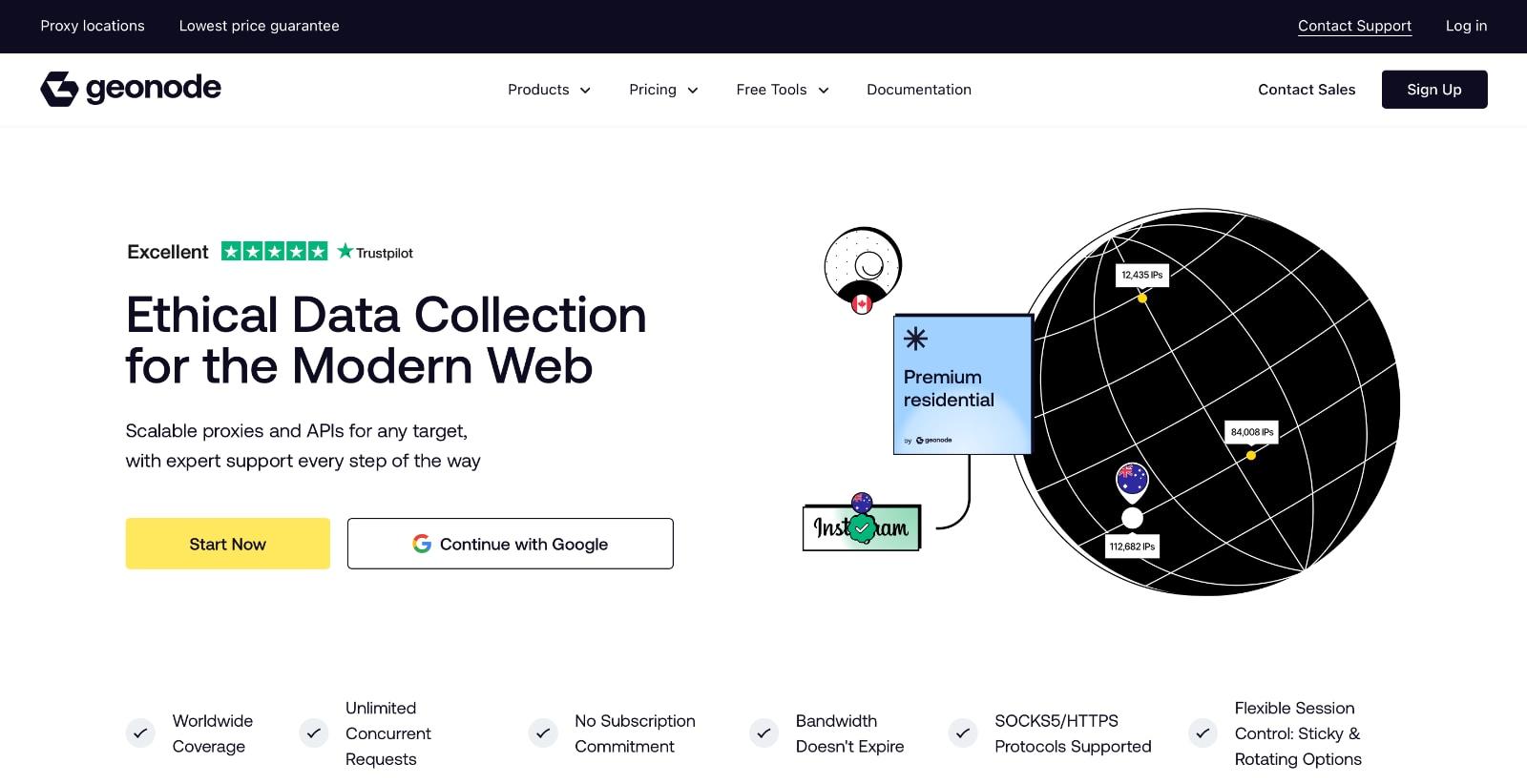
Geonode is a well-known brand that offers proxy and VPN services. It manages over 30 million proxies in total, targeting 140+ countries. This proxy provider supports SOCKS5 and HTTPS protocols, allows unlimited concurrent requests, and offers non-expirable bandwidth. That makes it suitable for both small- and large-scale projects.
We also need to praise Geonode’s ease of use. You can control proxies using a unified dashboard and easily integrate them with your research tools. Plus, you can count on residential, datacenter, and mobile proxies, which maximizes your reach.
Geonode doesn’t offer a free plan, but you can get its $1.00 trial, which gives you access to dedicated residential and datacenter IPs. Geonode’s residential proxies start at $4.00/GB, datacenter proxies are $1.00/GB, and mobile proxies cost $9.99/GB.
8. ProxyScrape
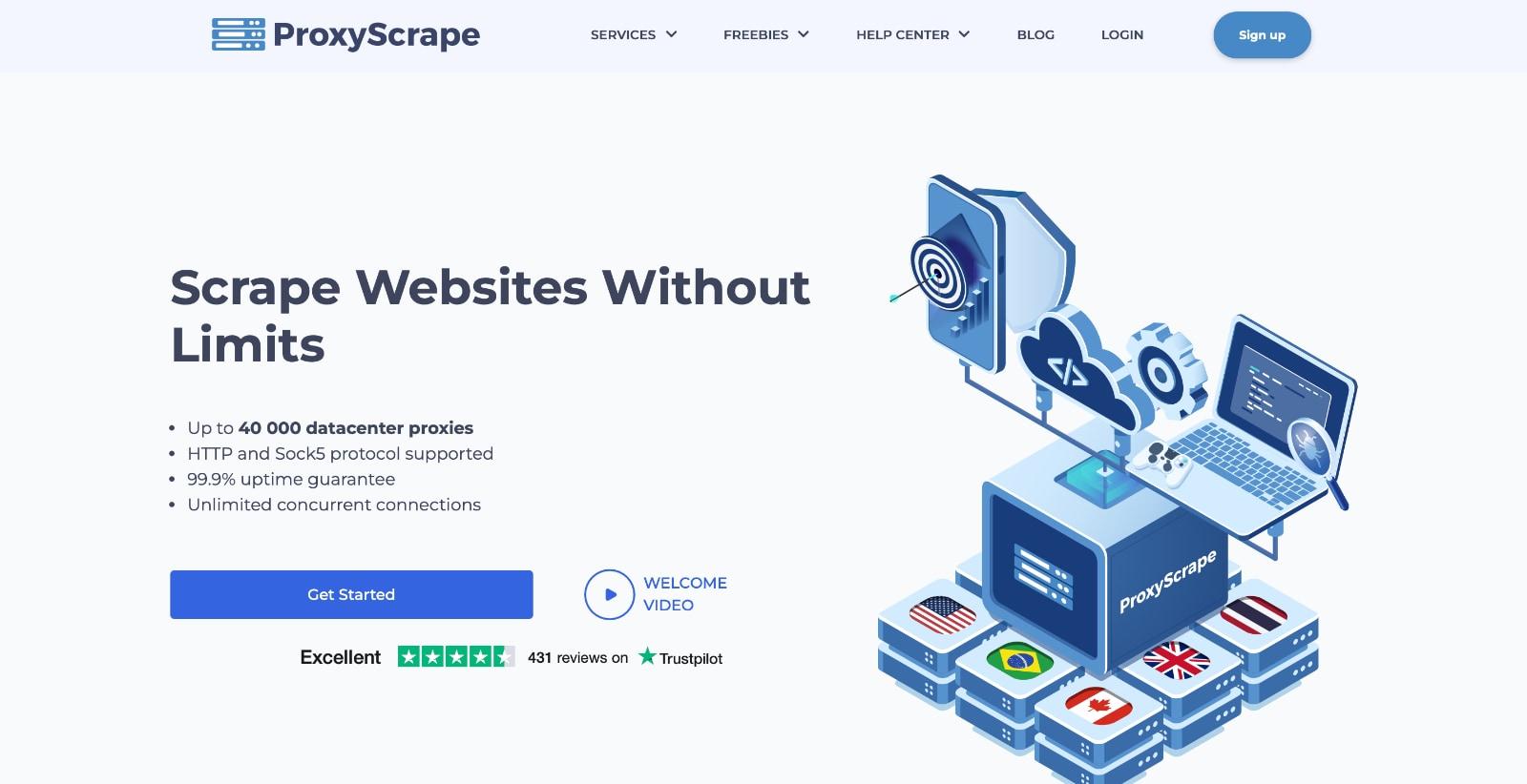
This proxy scraper is known for its free tier, providing an enticing entry point to the world of web scraping. It’s a very easy-to-use proxy solution based on HTTP, SOCKS4, and SOCKS5 protocols. It uses an API designed to prevent bans and rate limits, so potential IP blocks and CAPTHAs should never be an issue.
ProxyScrape offers high-end geo-targeting with proxies that can target practically any specific country. It can also render JavaScript for executing on-page actions and gather a website’s HTTP response body without rendering it. It also uses integrated proxies, taking over the worry of managing proxy connections on your own.
Getting started for free gets you 100,000 free daily ‘HTTP Response Body’ requests and 25,000 free daily ‘Browser HTML’ requests. Its paid plans start at $100.00/month, but that price varies depending on the target website and the difficulty of the scraping procedure.
9. Open Proxy Space
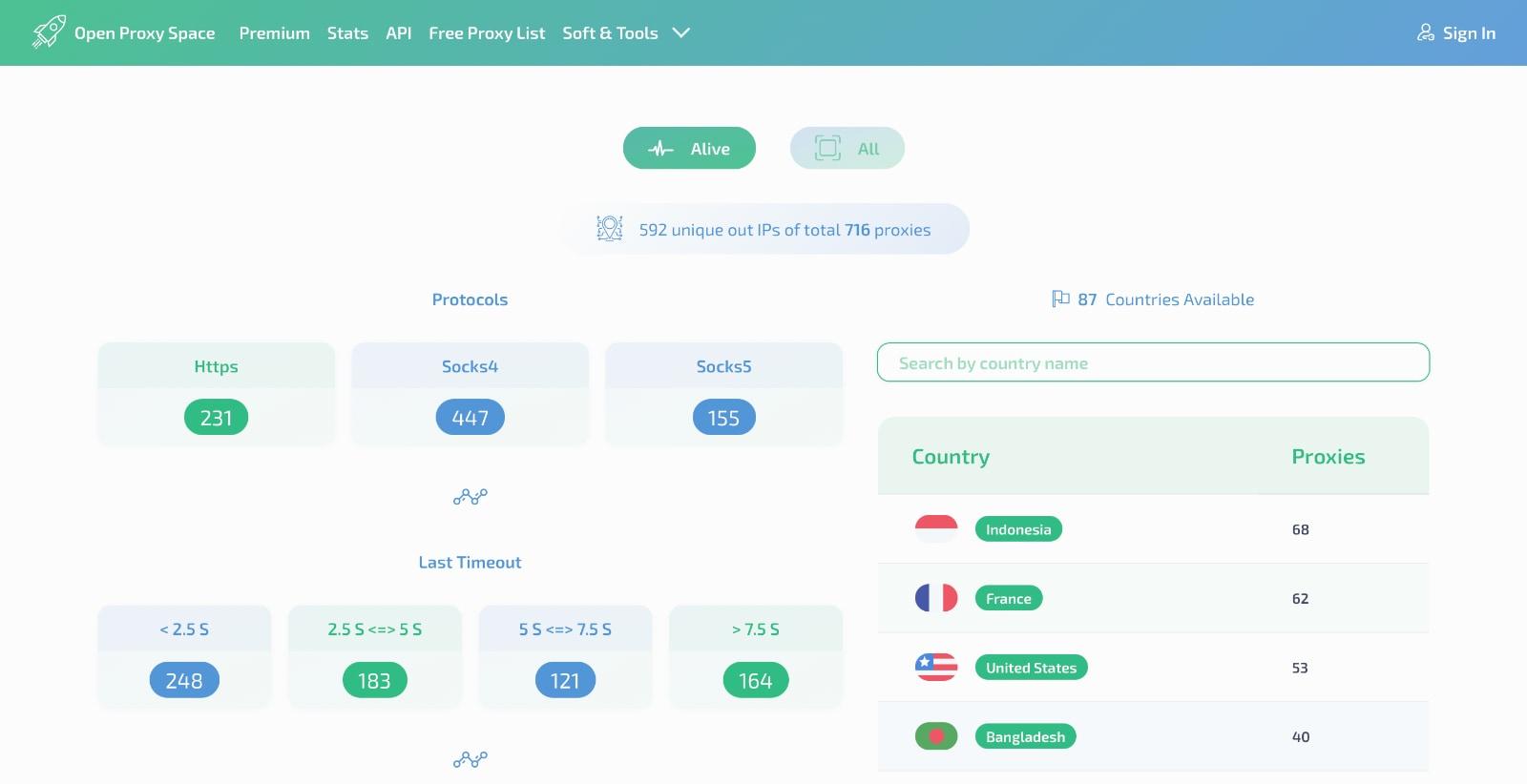 This proxy provider is trying to do things a bit differently. Instead of offering an all-in-one solution, it cuts its costs by focusing on providing a list of proxies primarily. As such, Open Proxy Space is a good option if you need a low-cost proxy solution that you know how to integrate with your web scraping system.
This proxy provider is trying to do things a bit differently. Instead of offering an all-in-one solution, it cuts its costs by focusing on providing a list of proxies primarily. As such, Open Proxy Space is a good option if you need a low-cost proxy solution that you know how to integrate with your web scraping system.
This scraping proxy solution offers hundreds of HTTPS, SOCKS4, and SOCKS5 proxies. It targets close to 90 countries, which is handy for bypassing geo-blocks. It also offers a variety of APIs, using which you can sort, filter, and use different types of connections.
You can get started with Open Proxy Space for free, where you get a limited range of IPs. If you decide to become a paying user, you’ll need to pay from $7.99/month to $59.99/year.
10. ProxyMesh
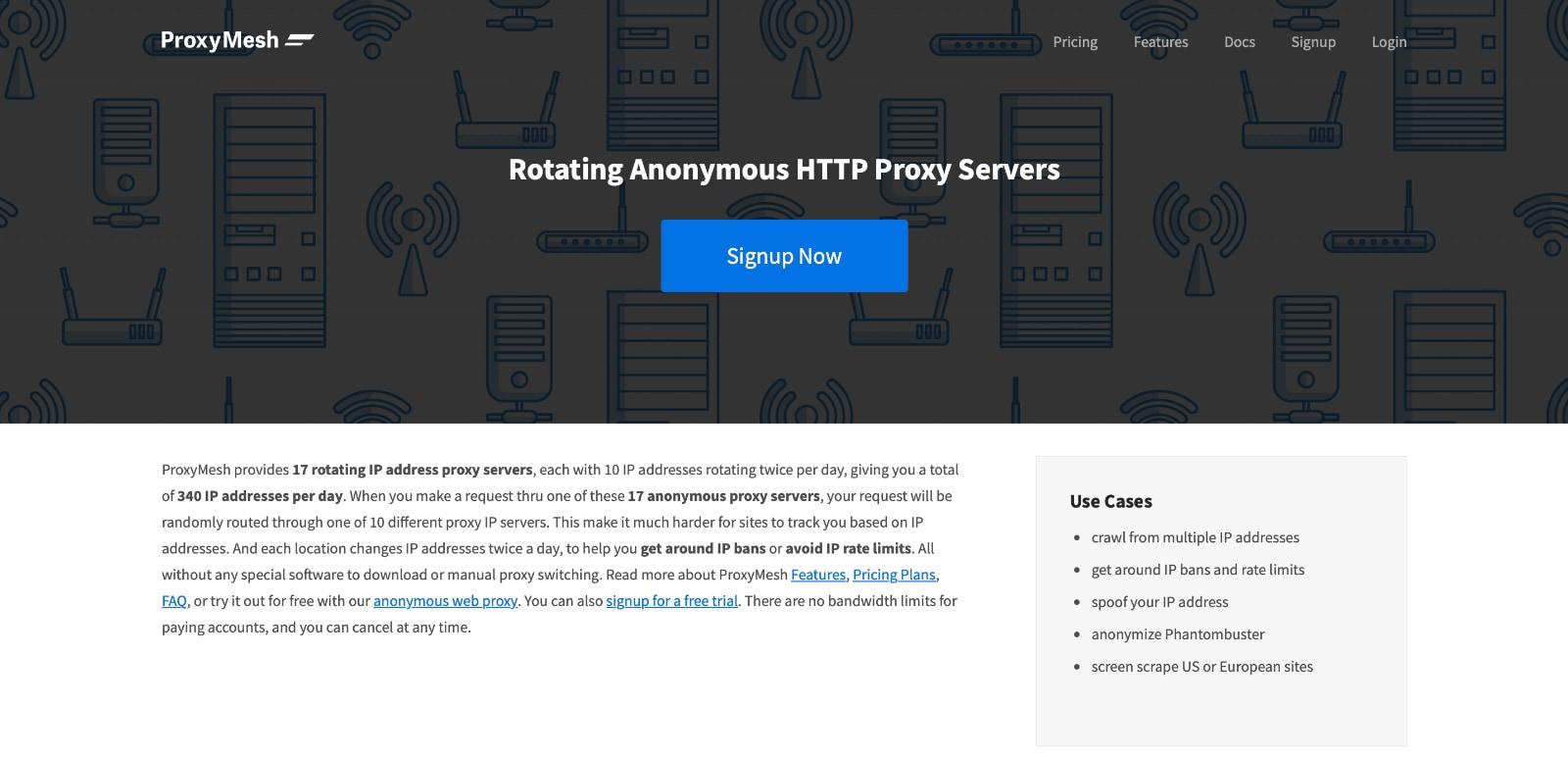
ProxyMesh is best known for its rotating proxy servers. In other words, this web scraper offers a set of high-quality IP addresses, all of which are ‘Level 1 Elite.’ In other words, they provide the highest class of anonymity. ProxyMesh’s IPs rotate twice daily, which significantly helps achieve optimal scraping results.
This proxy covers the United States, a range of European countries, Japan, Singapore, and Australia. Also, it supports up to 100 concurrent connections. As such, it’s an excellent option for web scraping. However, as per its technical documentation, it won’t provide the best results for social media scraping.
ProxyMesh offers a free trial with 100MB of bandwidth and one proxy location. Becoming a premium subscriber can cost you anywhere from $10/month to $100/month, based on how many proxy locations and IP addresses you need.
Best Proxy Services for Large-Scale Web Scraping
In this segment, we’ll review the most powerful web scrapers for large-scale projects. The following proxy providers offer in-depth customization, sizable IP pools, and various types of proxies, and many provide AI-powered features as well.
| IP Pool | Types of IPs | Locations | Free Trial | Support | |
|---|---|---|---|---|---|
| Bright Data | 72M+ | Residential Datacenter ISP Mobile | 125+ | Yes | Documentation FAQ Email support |
| Oxylabs | 100M+ | Residential Datacenter ISP Mobile | 190+ | Yes | Documentation Webinars FAQ Email support |
| Smartproxy | 65M+ | Residential Datacenter ISP Mobile | 160+ | No | Documentation Webinars FAQ Email support |
| SOAX | 190M+ | Residential Datacenter ISP Mobile | 100+ | Yes | Documentation FAQ Email support |
| NetNut | 85M+ | Residential Datacenter ISP Mobile | 195+ | No | Documentation FAQ Email support |
1. Bright Data
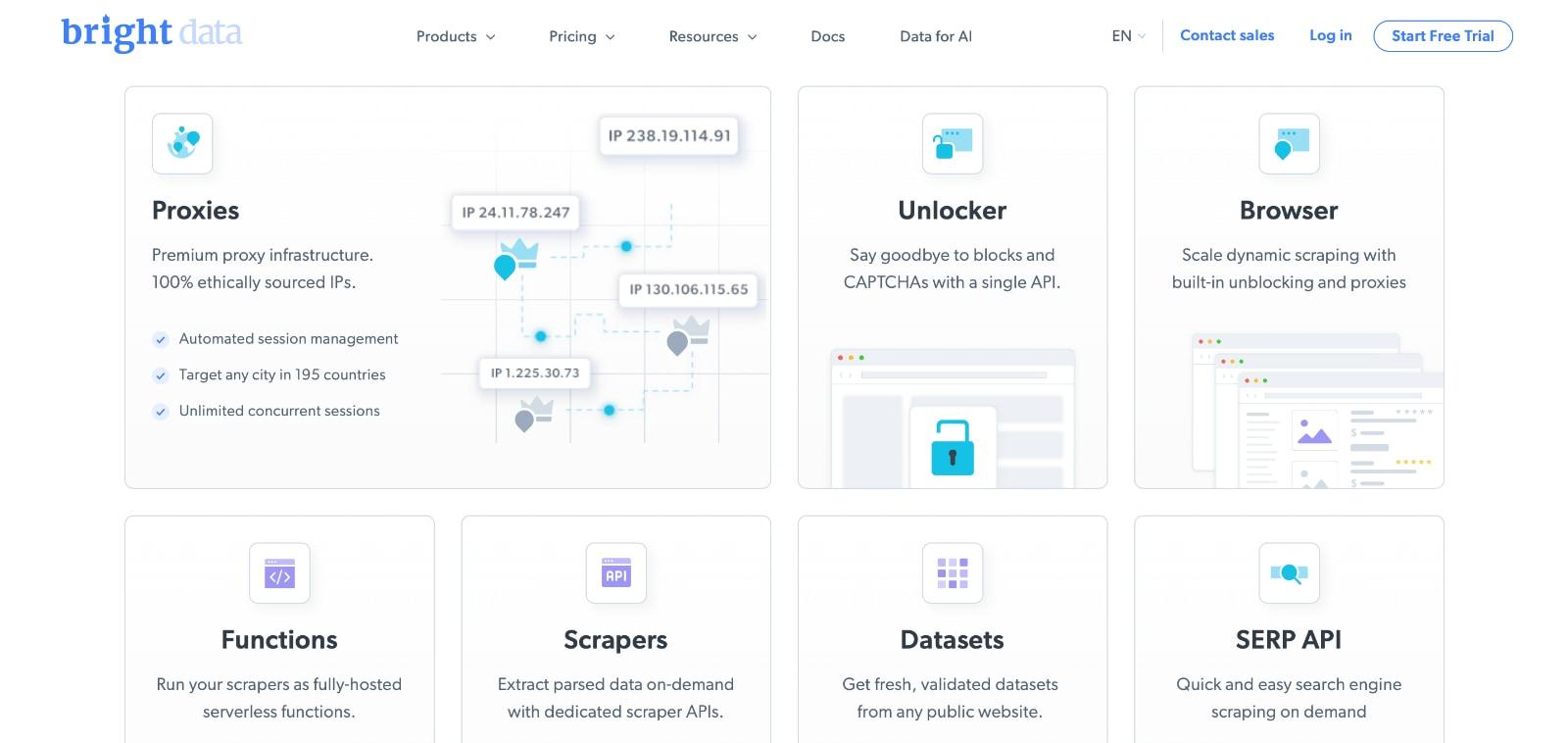 Bright Data is one of the most comprehensive proxy providers in the world. It has more than 72 million IPs, offering high customization and high-end reliability. Furthermore, it provides ethically sourced and fully GDPR- and CCPA-compliant residential proxies (static and rotating), mobile proxies, and datacenter proxies.
Bright Data is one of the most comprehensive proxy providers in the world. It has more than 72 million IPs, offering high customization and high-end reliability. Furthermore, it provides ethically sourced and fully GDPR- and CCPA-compliant residential proxies (static and rotating), mobile proxies, and datacenter proxies.
This is one of the rare ultra-fast proxy scrapers with almost any imaginable feature. You can target your scraping activities based on ZIP and ASN-level filtering, set up IP rotation systems, remove underperforming IPs, and perform JavaScript rendering. On top of that, Bright Data supports HTTP, HTTPS, and SOCKS5 protocols.
Bright Data’s residential proxies start at $5.88/GB, the same as mobile proxies, datacenter proxies cost $0.42/GB, while IPS proxies are $10.50/GB.
2. Oxylabs
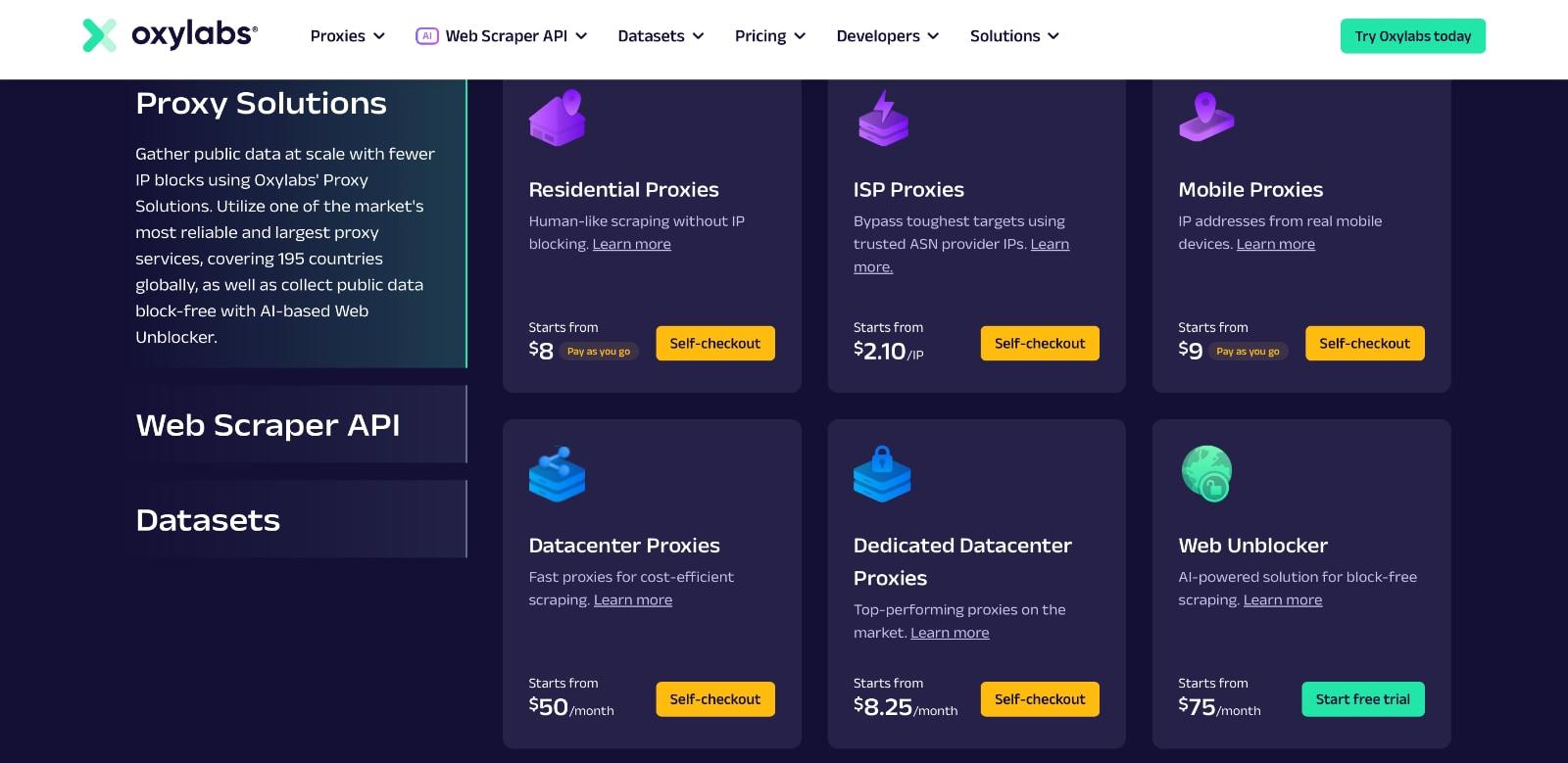
Oxylabs offers a proxy pool of over 100 million residential proxies for scraping, as well as datacenter, ISP, and mobile proxies. Even though it comes with a learning curve, it allows an unparalleled level of customization. Your search requests can be based on a country, city, ZIP code, or ASN. Plus, there’s no limit on concurrent requests.
It’s important to mention that Oxylabs offers its own AI Copilot for web scraping. Using this feature, you can generate ready-to-use code in seconds, parse complex HTML layouts, and scale your operation without complex adjustments. Furthermore, this feature helps with extracting nested and listed data and comes maintenance-free.
Oxylabs’ residential proxies start at $8.00/GB, ISP proxies are $2.10/GB, mobile proxies are $9.00/GB, and datacenter proxies start at $0.65/GB.
3. Smartproxy
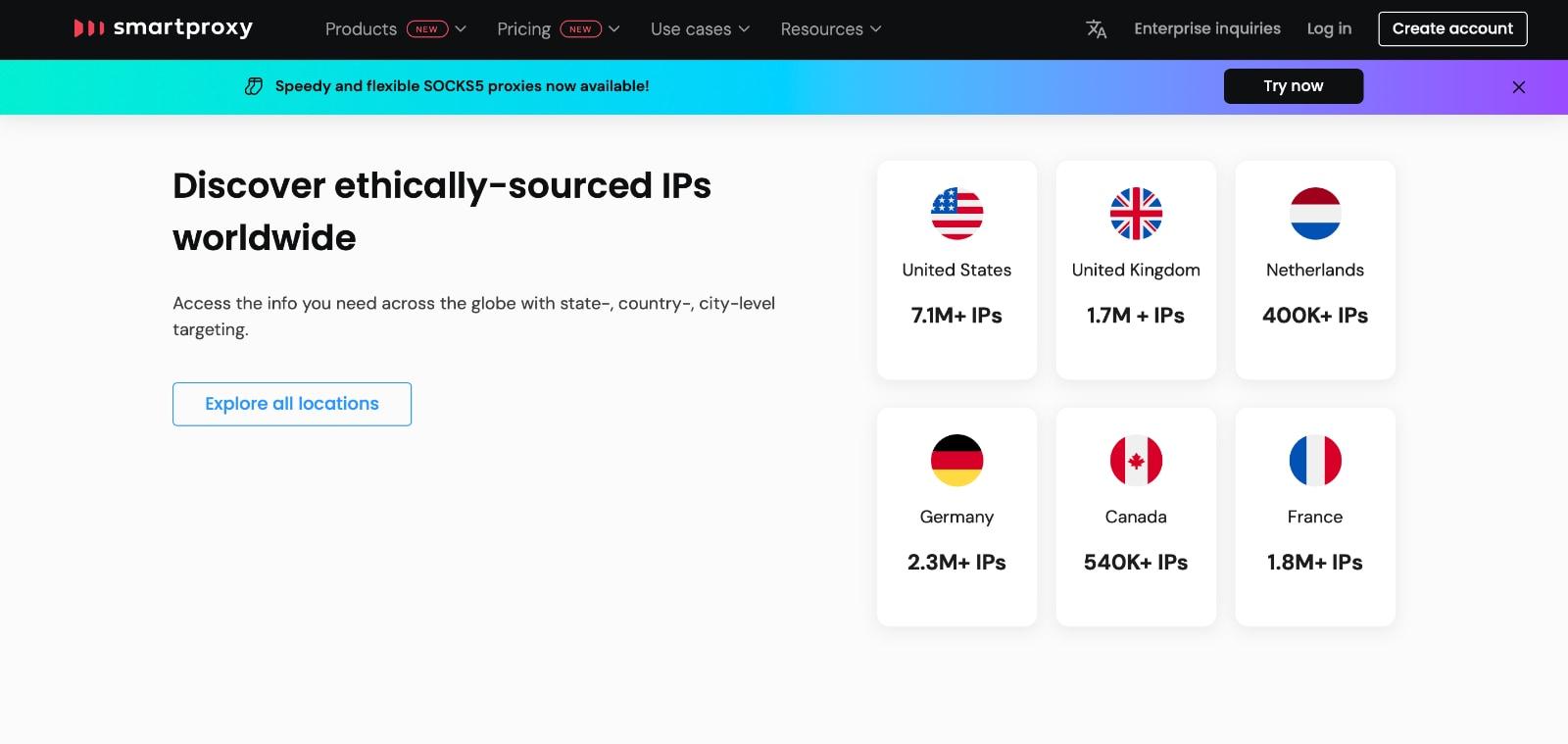 Smartproxy boasts 65+ million IPs, and you can rely on its residential proxies (static and rotating), datacenter, and mobile proxies. It features ethically sourced proxies, 160+ locations, servers in all 50 US states, and a near-perfect success score. Plus, it provides APIs for social media, e-commerce, and Web scraping proxies.
Smartproxy boasts 65+ million IPs, and you can rely on its residential proxies (static and rotating), datacenter, and mobile proxies. It features ethically sourced proxies, 160+ locations, servers in all 50 US states, and a near-perfect success score. Plus, it provides APIs for social media, e-commerce, and Web scraping proxies.
Other important features include advanced anti-bot protection, task scheduling (allowing you to get notified as each task is completed), and customizable output options, where you can choose from raw HTML or JSON results parsed in a table. Let’s not forget that Smartproxy offers scraping templates as well.
This provider’s residential proxies start at $2.20/GB, mobile proxies are $4.50/GB, while datacenter proxies cost $0.09/GB.
4. SOAX
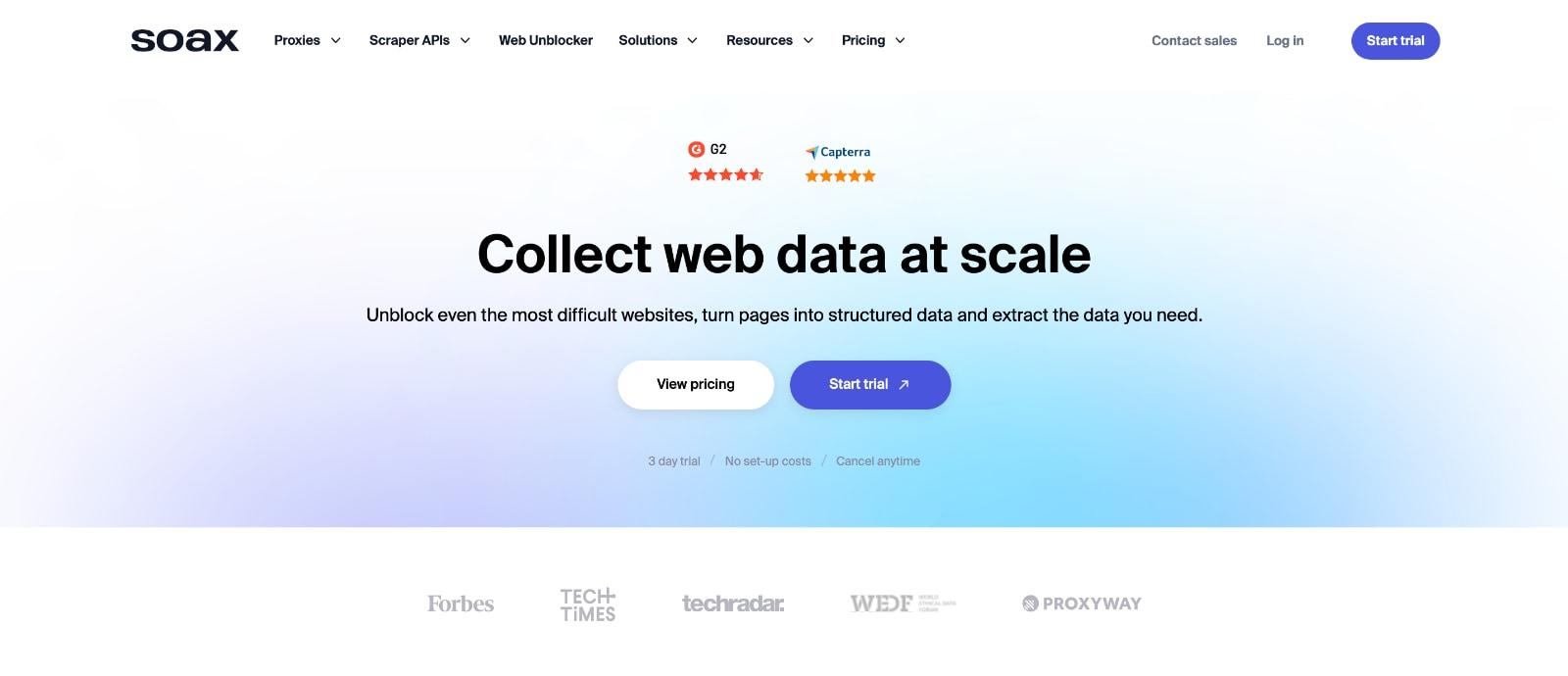 This proxy provider offers 190 million IPs and residential, datacenter, and mobile proxies with a 99.95% success rate. You’ll also find APIs for SERP, e-commerce, social media, and general web scraping. As is common among top-rated proxy scrapers, an AI component generates code based on a natural language input.
This proxy provider offers 190 million IPs and residential, datacenter, and mobile proxies with a 99.95% success rate. You’ll also find APIs for SERP, e-commerce, social media, and general web scraping. As is common among top-rated proxy scrapers, an AI component generates code based on a natural language input.
SOAX can scrape text, structured content, HTML files, documents, images, videos, prices, audience insights, and more. You can then use JSON or CSV formats to extract any data. Furthermore, SOAX can bypass CATCHAs, use custom browser fingerprinting, render JavaScript, and stick to automatic retries.
Residential proxies start at $2.20GB, mobile proxies cost the same, datacenter proxies are $0.40/GB, while US ISP proxies start at $2.20/GB.
5. NetNut
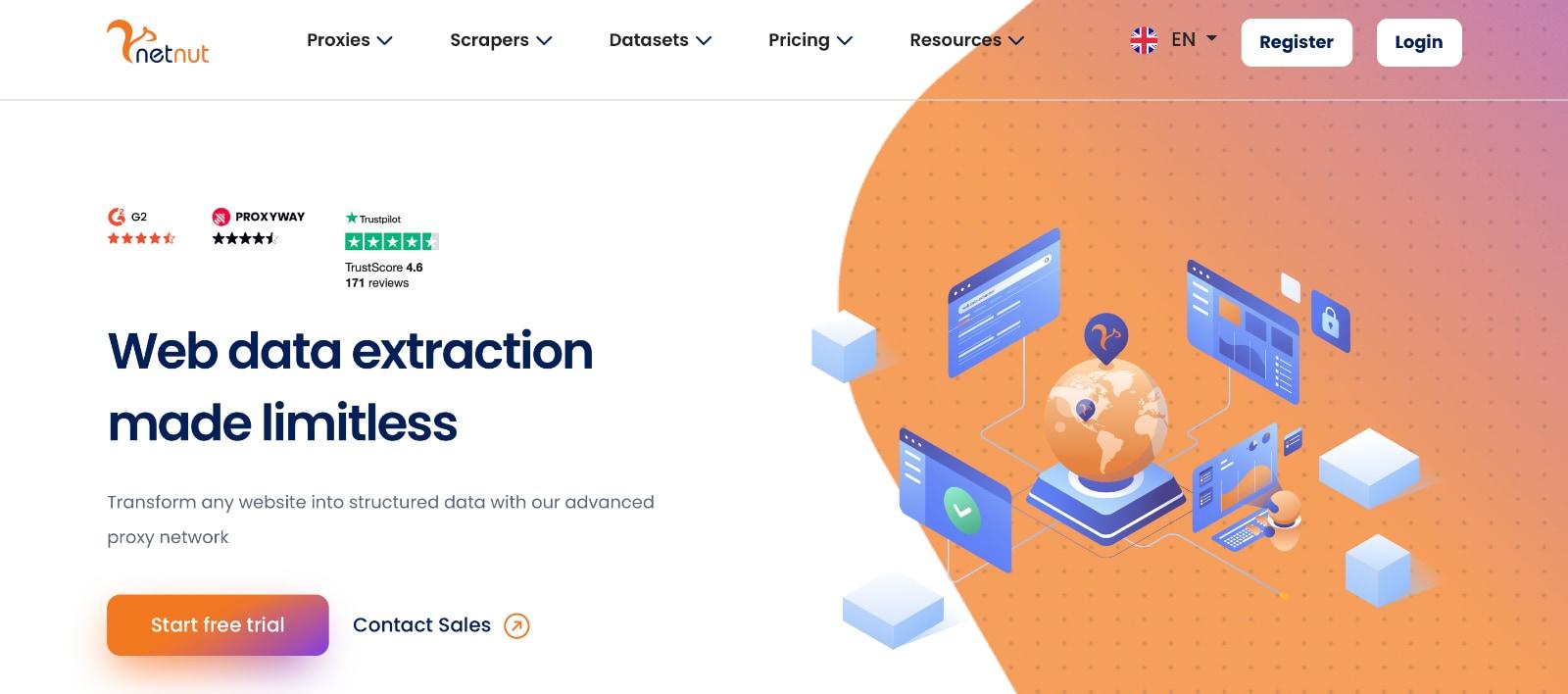 NetNut is an Israel-based proxy service for scraping data with 85+ million residential proxies. This provider also offers 5M+ mobile proxies and 150K+ datacenter proxies for scraping. It guarantees a 100% success rate in unblocking websites, features IP rotation and auto-retry, and uses dynamic fingerprinting to avoid anti-bot blocks.
NetNut is an Israel-based proxy service for scraping data with 85+ million residential proxies. This provider also offers 5M+ mobile proxies and 150K+ datacenter proxies for scraping. It guarantees a 100% success rate in unblocking websites, features IP rotation and auto-retry, and uses dynamic fingerprinting to avoid anti-bot blocks.
In addition, NetNut offers in-depth integration with numerous browsers and web scraping tools. At the same time, its centralized dashboard allows you to manage proxies in real time, dive into detailed analytics, and customize settings. Let’s not forget to mention that NetNut’s proxies are spread evenly across the entire world.
This provider’s residential proxies start at $5.00/GB, mobile proxies cost $6.46/GB, while datacenter proxies are the most affordable option, at $1.00/GB.
How to Choose the Best Proxy Scraper Service
Choosing a proxy for scraping requires you to focus on the size of its pool of IP addresses, data parsing abilities, dynamic content rendering, flexible storage options, documentation, and support. Let’s take a closer look:
- IP Addresses Pool: You’ll want a certain pool of IP addresses and virtual locations based on your scraping requirements. In general, it’s always better to have access to more IP addresses, especially if you plan on scraping data from websites that employ high-end protective measures.
- Data Parsing Ability: Parsing helps with processing large volumes of data, presenting you with “clean” data. It’s important to know that some providers offer parsing functionality that works only with specific e-commerce websites. Specialized web scrapers typically employ more powerful parsers.
- Dynamic Content Rendering: E-commerce stores using JavaScript to load dynamic content require more complex scraping. In that case, you should go for a more high-end proxy scraper that lets you establish various rules and parameters that meet your specific needs. JavaScript scrapers usually cost more, though.
- Flexible Storage Options: Web scraping can produce a lot of data, especially when done on a large-scale level. We highly recommend checking if your chosen provider allows you to save data to CSV, JSON, or other types of databases. Many providers also integrate with cloud storage solutions.
- Support and Documentation: Customer support is crucial, as you wouldn’t want to waste time fixing technical issues yourself. Aim for a provider with live chat support. Also, check what kind of documentation you’ll get; you’ll need comprehensive setup guides, explainers, and more.
Conclusion
Unlike a few years back, today’s market of proxy scrapers is highly saturated. As this article proves, numerous high-quality solutions exist. And, as with many other industries and technologies, web scraping is experiencing a fast-paced revolution thanks to AI, which has already become an inseparable part of data extraction.
The final choice depends on your specific needs, requirements, and budget. The recommendations found above should meet the needs of various web scraping operations, so it’s up to you to take your pick. Lastly, remember that most proxy scrapers offer a free trial, allowing you to experience their full power without making an investment.
